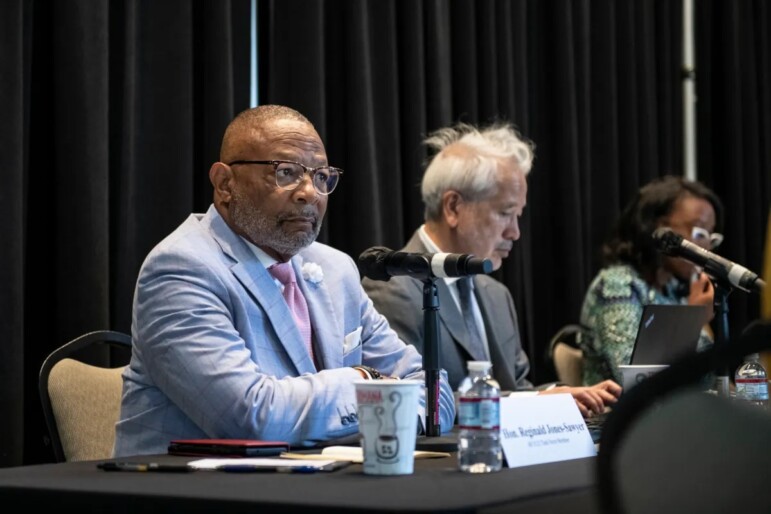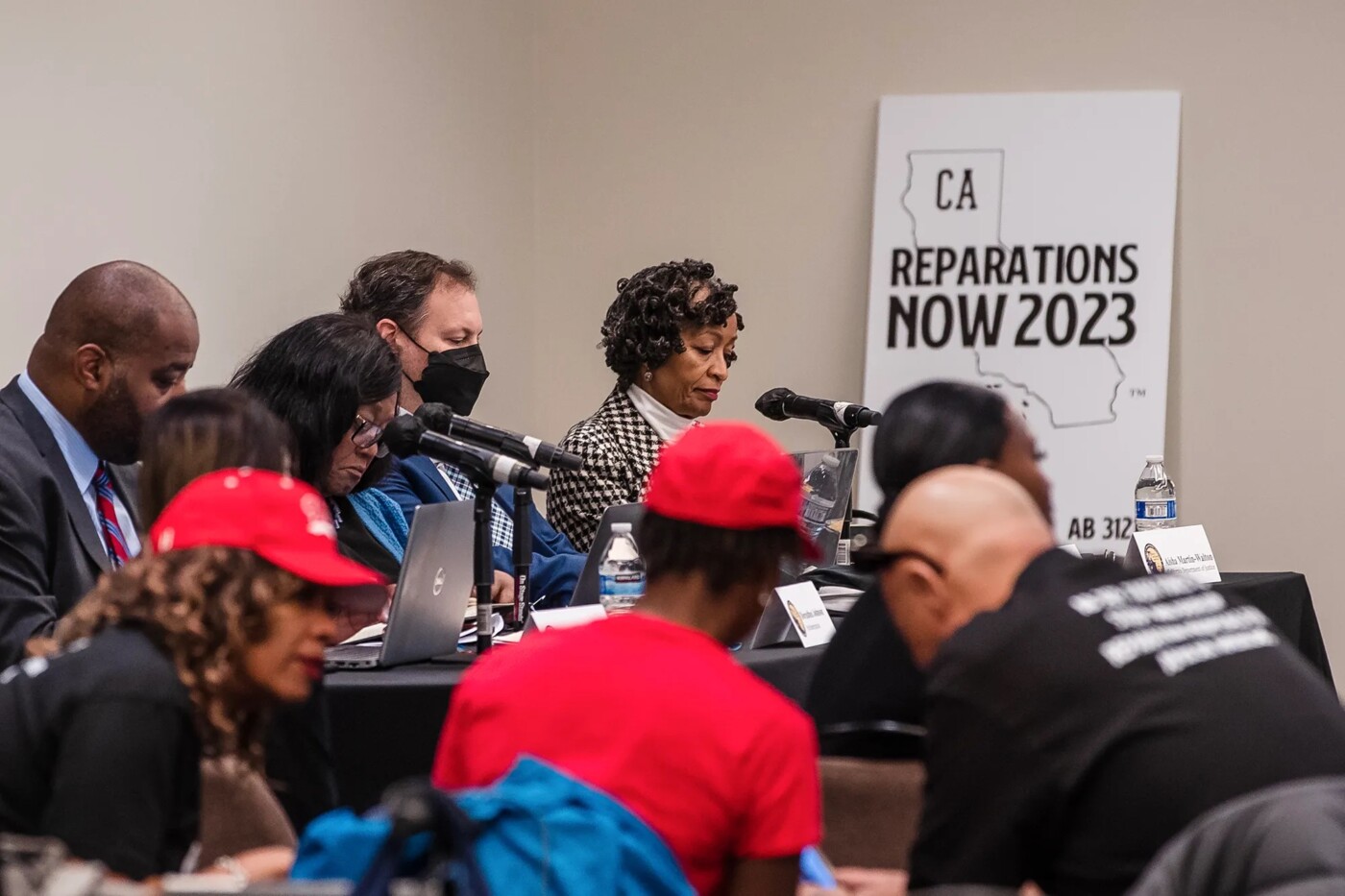In less than 10 weeks, by July 1, California’s Reparations Task Force is set to deliver final recommendations to the Legislature for how the state can begin to undo 300 years of harm from slavery and racism.
With the clock winding down, two key questions remain unanswered: How much would the proposed reparations cost? And will the Legislature support the recommendations of the task force?
The first-in-the-nation task force was appointed in 2020 to study whether and how the state government should issue reparations for residents who are descendants of enslaved persons.
At a task force meeting March 29 and 30, state Sen. Steven Bradford, a Democrat representing Gardena, said it will be an “uphill fight” to get the Legislature to seriously engage with the recommendations.
Some new data is bearing that out.
Back in 2020, 12 legislators voted against the law that created the reparations task force, while 58 lawmakers voted in favor of it.
Recently, in an informal emailed poll of the 80 assemblymembers by CalMatters, just three legislators stated their support for the task force’s years-long effort. The rest did not respond.
Assemblymember Tina McKinnor, a Democrat from Inglewood, said she “strongly supports monetary reparations for the descendants of formerly enslaved people and believes the Legislature would support the final recommendations from the Task Force.”
Assemblymember Damon Connolly, a Democrat from San Rafael (near San Francisco), said he also supports reparations and the task force’s preliminary recommendations, which he said are long overdue.
“These recommendations are the culmination of collaboration between experts who understand the scope and legacy of how racism and disenfranchisement have had long-term socioeconomic impacts on California’s African-American communities,” he said in a statement. “This report contains recommendations that are common-sense and comprehensive — changes that should have been considered long ago.”
Heavy lifting
Assemblymember David Alvarez, a Democrat from San Diego, noted the historic work of the task force but stopped short of saying he supports the preliminary recommendations.
“I appreciate the work the Reparations Task Force has done,” he said. “The Task Force is led by well-respected members of the African American community who have taken the time to study and discuss these historical effects over the last two years. Once the Task Force concludes their meetings and releases a final report with recommendations, I will review the complete findings.”
Bradford and Assemblymember Reggie Jones-Sawyer, a Democrat from Los Angeles, are both on the task force.
Bradford described the heavy lifting that remains to be done to get the Legislature to approve reparations. He highlighted a prior failed effort last session to get a constitutional amendment outlawing involuntary servitude placed on the California ballot.
“Something as simple as removing that from our state constitution, where other states have, and we couldn’t even do that,” he said.
(Opponents of that measure noted that removing the language that allows involuntary servitude from Calilfornia’s constitution would result in tens of millions of dollars in extra state cost because prisoners would have to be paid for their work during incarceration.)
So far, news coverage of the reparations task force’s work has largely focused on what dollar amount the task force might recommend the state pay descendants of formerly enslaved people.
The figure that went around the world recently was $800 billion. But many news reports confused that number, saying it was a recommendation for reparations payouts when it actually was a partial estimation of financial losses that economists said Black people experienced over decades of inequalities.
Dollars “least important”
So far, the task force has yet to vote on specific dollar amounts at its meetings.
“We did not, at this last hearing, arrive at a single dollar figure. We’re not there yet,” said Cheryl Grills, a task force member and clinical psychologist. Grills is also a founding member of Community Coalition, which does outreach work in South L.A. communities.
The news media’s preoccupation with a final dollar figure has become a point of frustration, task force members said. The task force and its experts have produced thousands of pages of documentation, data and research into various categories of injustice — everything from encounters with the criminal justice system to barriers to homeownership.
“We want to make sure that this is presented out in a way that does not reinforce the preoccupation with a dollar figure, which is the least important piece of this,” said Grills.
“It’s important, but it’s the least important in terms of being able to get to a point in our country’s history and in California’s history where we recognize that the harm cuts across multiple areas and domains and that the repair needs to align with that.
“It’s really unfortunate. I’m actually sad to see that our news media is not able to nuance better. It’s almost like, ‘What’s going to be sensational’ as opposed to what’s important.”
The task force at its March 29 meeting decided that descendants of American slaves in California would have at least two pathways for claiming compensation for the injustices and legacy of chattel slavery.
Two options
One of those avenues would be a baseline amount that would potentially apply to all descendants of American slaves who meet a California residency requirement. That compensation would be for the general community harm and legacy of slavery as well as the state’s role in perpetuating racism. The amount has not been decided.
The other route would be people applying for redress for specific injustices experienced under one of five categories outlined in a 40-page report compiled by economists working with the state Department of Justice.
Those five categories of harm include health, disproportionate mass incarceration and over-policing, housing discrimination, unjust property taken by eminent domain and the devaluation of Black-owned businesses.
Those category payments would be in addition to or instead of baseline compensation, task force members said.

Task force members do not appear to agree about whether or not the group should decide on a dollar figure recommendation to the Legislature. In an interview with CalMatters last week, Jones-Sawyer said the dollar amount would be up to the Legislature and governor to decide, while other task force members said the exact figure hasn’t been decided on yet.
The panel’s chair, Kamilah Moore, told KCRA, a television station in Sacramento, that it’s up to the state Legislature to ascribe a dollar amount, based on methodology economists recommended and which the task force approved.
“The task force is pretty much done regarding the compensation component. Our task was to create a methodology for calculation for various forms of compensation that correspond with our findings,” she told the station.
Hearts and minds
Jones-Sawyer said he agrees with Bradford that task force members have their work cut out for them. But he stressed the impact the task force’s interim report may have on “changing hearts and minds.”
“Any legislation is difficult. Period,” said Jones-Sawyer. “Some obviously are easier than others, but all of them require a lot of work.
“As I’ve spoken to individuals who didn’t even understand why we wanted to do this, there have been a few who have read the report and it was eye-opening for them,” he added. “For people who read the interim report, to hear them say ‘I didn’t know’ was probably the most gratifying thing I could hear.”
Jones-Sawyer said one of the most important recommendations from the report “doesn’t cost a dime” — an apology letter from the state of California.
“I think that one is as important as the others,” he said.
The task force decided at its last set of meetings that California should issue a formal apology “for the perpetration of gross human rights violations and crimes against humanity on African slaves and their descendants.”
Donald Tamaki, a task force member and lawyer from San Francisco, said apologizing would acknowledge lost and often untold history.
“Our history has been so buried, so erased, so denied, I think that is an essential element of our mission,” he said.
Jones-Sawyer said he believes Gov. Gavin Newsom is taking the reparations responsibility seriously.
“I think the governor will do an excellent job in showing that he’s sincere about it, and that he believes in the apology that comes out of the state of California,” said Jones-Sawyer.
A divided public
Support for the reparations movement is pouring in from outside organizations. Tamaki and Grills have been reaching out to organizations throughout California, asking them to endorse the task force’s work. In a few weeks, endorsements grew from 30 to more than 130 organizations.
However a few people who phoned into the task force meetings during the public comment periods took on an angry tone.
Some callers and emailers said they might move out of California if Black people are paid reparations. Support and opposition among published emails to the task force were close — at least 104 expressed support for some form of reparations for Black residents while at least 93 said they were against it.
Many of the skeptics questioned whether other oppressed groups should get reparations.
“The most problematic issue is that California was not a slave state in the first place,” an email reads. “Many ethnic groups have been discriminated against in California — Indians, Asians, Latinos, LGBTQ+. If you open reparations to one group, you must do the same for all discriminated groups.” The writer’s name was redacted.
According to the task force’s interim report, despite California entering the Union in 1850 as a free state, its early state government supported slavery. In 1852, California passed and enforced a fugitive slave law that was harsher than the federal fugitive slave law and made the state more hospitable to slavery than other states, the report states.
Adding to that, in the latter 1850s, the California Supreme Court upheld the rights of an enslaver to retain ownership of Archy Lee, a 19-year-old Black man Charles Stovall took to California from Mississippi. The justices decided in Stovall’s favor because he had a persistent illness and had not known California’s laws, the task force reported.
Listening sessions
Nationally, views on reparations in general vary widely by race. A 2021 Pew Research Center study found 3 in 10 U.S. adults say descendants of people enslaved in the United States should be repaid in some way, such as with land or money. About 7 in 10 (68%) say these descendants should not be repaid, the study found.
Broken down by race, 77% of Black Americans support reparations, compared to 18% of white Americans.
The next set of task force meetings is scheduled to start May 6 in the East Bay Area. So far, an exact location has not been publicized.
In addition to task force meetings, some community groups, including the Coalition for a Just and Equitable California, are holding listening sessions about reparations across California. There will be a town hall in Riverside on April 21 involving Moore and a listening session in San Diego on April 29 with Montgomery-Steppe.
